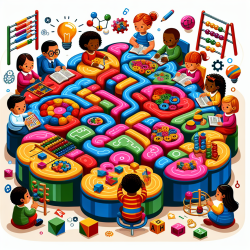Empowering Practitioners: Implementing Family-Mediated Virtual Models for Children with Neurological Impairments

The COVID-19 pandemic has reshaped many aspects of our lives, including how we deliver care to children with neurological impairments. A recent study from Bulgaria titled
Essential elements of a care delivery model for children with neurological impairments during the COVID-19 pandemic: Notes from Bulgaria offers valuable insights into implementing family-mediated virtual models (FMVM) to ensure continuity of care. Here’s how practitioners can leverage these findings to enhance their skills and provide better support to their young clients and their families.
Understanding the Family-Mediated Virtual Model (FMVM)
The FMVM approach involves parents as active participants in their child's therapy. This model is built on three core principles:
- Information Exchange: Clear communication between practitioners and parents is crucial.
- Respectful and Supportive Care: Emphasizing the strengths of the family rather than focusing on deficiencies.
- Partnership: Collaborating with parents to create a tailored care plan.
Implementing FMVM: Practical Steps for Practitioners
To effectively implement FMVM, practitioners can follow these steps:
- Engage Parents as Mediators: Establish a collaborative partnership with parents. Train them to carry out therapeutic activities at home, ensuring they feel confident and capable.
- Involve Families in Decision-Making: Include parents and children in discussions about goals and methods. This ensures that the therapy aligns with the child’s preferences and family routines.
- Provide Psychological Support: Offer emotional support to parents to help reduce stress and anxiety, which can enhance their effectiveness as mediators.
- Utilize Technology: Use personal computers, smartphones, and tablets to conduct virtual sessions, making therapy accessible even during lockdowns.
- Monitor and Assess Outcomes: Regularly review the progress and adjust the care plan as needed. Feedback from parents can provide valuable insights.
Encouraging Further Research
While the FMVM shows promise, more research is needed to fully understand its effectiveness. Practitioners are encouraged to:
- Conduct surveys and collect data on the outcomes of FMVM to build a robust evidence base.
- Explore the impact of FMVM on different types of neurological impairments and across various socioeconomic backgrounds.
- Share findings with the broader community to promote best practices and continuous improvement.
Conclusion
The family-mediated virtual model is a powerful tool for delivering care to children with neurological impairments, especially during times of crisis like the COVID-19 pandemic. By implementing these strategies, practitioners can enhance their skills, support families more effectively, and contribute to the growing body of research in this field.To read the original research paper, please follow this link:
Essential elements of a care delivery model for children with neurological impairments during the COVID-19 pandemic: Notes from Bulgaria.
Citation: Nikolova, S. P., Pancheva-Dimitrova, R. Z., Yoncheva, N., Vasileva, V., & Cherkezova, B. (2022). Essential elements of a care delivery model for children with neurological impairments during the COVID-19 pandemic: Notes from Bulgaria. Frontiers in Public Health, 10, 932847. https://doi.org/10.3389/fpubh.2022.932847










